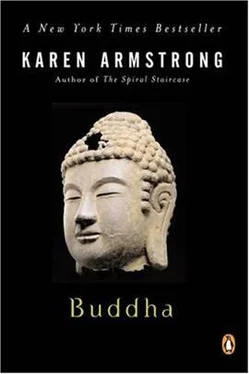After this victory over Mara, which was really a victory over himself, there was nothing to hold Gotama back. The gods returned from the heavens and waited breathlessly for him to achieve his final release, for they needed his help as much as did any human being. Now Gotama entered the first jhana and penetrated the inner world of his psyche; when he finally reached the peace of Nibbana all the worlds of the Buddhist cosmos were convulsed, the heavens and hells shook, and the bodhi tree rained down red florets on the enlightened man. Throughout all the worlds,
the flowering trees bloomed; the fruit trees were weighed down by the burden of their fruit; the trunk lotuses bloomed on the trunks of trees… The system of ten thousand worlds was like a bouquet of flowers sent whirling through the air.
The ocean lost its salty taste, the blind and the deaf were able to see and hear; cripples could walk and the fetters of prisoners fell to the ground. Everything suddenly glimpsed new freedom and potency; for a few moments, each form of life was able to become more fully itself.
But the new Buddha could not save the world vicariously. Every single creature would have to put Gotama’s program into practice to achieve its own enlightenment; he could not do it for them. Yet at first, it seemed that the Buddha, as we must now call Gotama, had decided against preaching the Dhamma that alone could save his fellow creatures. He would often be known as Sakyamuni, the Silent One from the republic of Sakka, because the knowledge he had acquired was ineffable and could not be described in words. Yet throughout the Ganges region, people were longing for a new spiritual vision, especially in the cities. This became clear, the Pali texts tell us, almost immediately after the Buddha’s enlightenment, when two passing merchants, called Tapussa and Bhalluka, who had been informed of the great event by one of the gods, came to the Buddha and paid homage to him. They became his first lay followers. Yet despite this initial success, the Buddha was still reluctant. His Dhamma was too difficult to explain, he told himself; the people would not be prepared to undergo the arduous yogic and moral disciplines that it required. Far from wishing to renounce their craving, most people positively relished their attachments and would not want to hear his message of self-abandonment. “If I taught the Dhamma,” the Buddha decided, “people would not understand it and that would be exhausting and disappointing for me.”
But then the god Brahma intervened; he had watched Gotama’s enlightenment with close attention, and was devastated to hear this decision. If the Buddha refused to teach his Dhamma, Brahma cried in dismay, “the world will be lost, the world will not have a chance!” He decided to intervene. The Pali texts introduce the gods into their narrative quite unselfconsciously. The gods were part of their universe, and these legends, which show Mara and Brahma contributing to the Buddha’s story, illustrate the tolerant partnership that would exist between the new religion of Buddhism and the older cults. Unlike the Hebrew prophets, who poured scorn on the rival deities of their pagan neighbors, the early Buddhists felt no need to stamp out the traditional worship still enjoyed by vast numbers of people. Instead, the Buddha is shown allowing the gods to help him at certain key moments of his life. Like Mara, Brahma may also have represented an aspect of the Buddha’s own personality. This was, perhaps, a way of suggesting that the gods were projections of subconscious human forces. The story of Brahma’s intervention may indicate that there was a conflict within the Buddha’s mind, and that while one part of him wanted to retire into solitude and enjoy the peace of Nibbana undisturbed, there was another part of him that realized that he simply could not neglect his fellow creatures in this way.
In a complete reversal of their usual roles, Brahma left his heaven, descended to earth, and knelt before the new Buddha. “Lord,” he prayed, “please preach the Dhamma… there are people with only a little desire left within them who are pining for lack of this method; some of them will understand it.” He pleaded with the Buddha to “look down at the human race which is drowning in pain and to travel far and wide to save the world.” Compassion had been an essential component of the Buddha’s enlightenment. One legend has it that Gotama was born from his mother’s side at the level of her heart. It is a parable-not, of course, to be taken literally-of the birth of the spiritual human being. Only when we learn to live from the heart and to feel the suffering of others as if it were our own do we become truly human. Where a bestial man or woman puts self-interest first, a spiritual person learns to recognize and seeks to alleviate the pain of others. Many of us maintain ourselves in a state of deliberate heartlessness, a condition similar to the young Gotama’s heavily defended pleasure-palace. But during his meditations and long preparation for Buddhahood, Gotama had opened his whole self to the fact of dukkha and allowed the reality of suffering to resonate within the deepest recesses of his being. He had made himself realize the Noble Truth of Suffering with “direct knowledge,” until he had become one with it and integrated it wholly. He could not remain locked away safely in his private Nibbana; he would thus be entering a new kind of pleasure-palace. Such a withdrawal would violate the essential dynamic of the Dhamma: the Buddha could not practice the four “immeasurables,” sending out benevolent feelings to the four corners of the earth simply for his own spiritual benefit, while his fellow creatures languished in a world gone awry. One of the chief ways in which he had gained ceto-vimutti, the release of enlightenment, had been through the cultivation of loving-kindness and selfless empathy. The Dhamma demanded that he return to the marketplace and involve himself in the affairs of a sorrowing world.
To his great credit, the god Brahma (or the higher part of the Buddha’s personality) realized this. The Buddha listened carefully to his plea and, the Pali text tells us, “out of compassion, he gazed upon the world with the eye of a Buddha.”This is an important remark. A Buddha is not one who has simply attained his own salvation, but one who can sympathize with the suffering of others, even though he himself has won an immunity to pain. Now the Buddha realized that the gates of Nibbana were “wide open” to everybody; how could he close his heart to his fellows? An essential part of the truth he had “realized” under the bodhi tree was that to live morally was to live for others. He would spend the next forty-five years of his life tramping tirelessly through the cities and towns of the Ganges plain, bringing his Dhamma to gods, animals, men and women. There could be no limits to this compassionate offensive.
But who should be first to hear the message? The Buddha thought at once of his former teachers Alara Kalama and Uddaka Ramaputta, but some gods, who were waiting nearby, told him that they had both recently died. This was a great grief. His teachers had been good men who would certainly have understood his Dhamma; now, through no fault of their own, they had missed their chance and were condemned to yet another life of pain. This news could have given the Buddha a new sense of urgency. He next recalled the five bhikkhus who had practiced the penitential disciplines of tapas with him. They had fled from him in horror when he had taken his first meal, but he could not allow this rejection to cloud his judgment. He remembered how helpful and supportive they had been during their time together, and set out directly to find them. Hearing that they were now living in the Deer Park outside Varanasi (the modern Benares), he began his journey, determined to set the Wheel of the Dhamma in motion and, as he put it, “to beat the drum of the deathless Nibbana.” He did not expect much. The Buddha mistakenly believed that his teaching would only be followed for a few hundred years. But people had to be rescued, and the Buddha was compelled, by the very nature of the enlightenment that he had achieved, to do what he could for them.
Читать дальше












